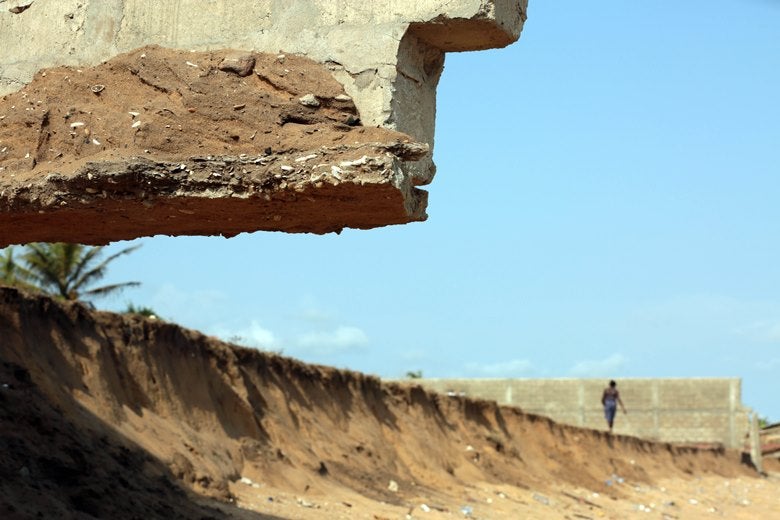
Togolese families often place talismans, thought to contain magical or spiritual properties, outside their homes facing the Atlantic Ocean in hopes of protecting their dwellings from encroaching tides.
Unfortunately, dozens of villages have been devoured since the mid-1990s, leaving behind shells of houses, livelihoods and memories in the wake of a coast receding as much as 5-10 meters per year. When expatriates return to Togo’s coast to visit their childhood homes, they are astonished to see that communities have literally washed out to sea.
Some areas of West Africa lose 23-30 meters in any given year to erosion. Togo, Benin, Cote D’Ivoire, Mauritania and Sao Tome and Principe, as well as Ghana and Senegal, lose roads, homes, and schools to the collapse of the coastline. At the same time, flash floods are also increasing, affecting more than 500,000 people every year.
Coastal areas house about one third of West Africa’s population and more than half of its urban population. Fifty-six percent of the region’s gross domestic product (GDP) is generated close to shore, where poor management of erosion increases social and economic vulnerability.
Late October, I was in Lomé at our launch workshop for coastal adaptation. It was a galvanizing moment for regional governments, partners, and stakeholders, as we took stock of issues and technical training, and examined prospects for sustainable investment. In response to regional demand, the World Bank’s West Africa Coastal Area Management Program (WACA) joined forces with the West Africa Economic and Monetary Union (WAEMU) and the International Union for the Conservation of Nature (IUCN).
The World Bank, WAEMU and other international partners are committed to assist in the development of a joint investment program that addresses coastal risks. Technical experts are laying the groundwork to fight against future coastal erosion as we involve all parties and sectors associated with the coastal areas from both social and economic perspectives. We’ve delivered technical assistance, gotten a regional IDA project in the pipeline, and established partnerships with France and WAEMU in record time, as a result of request from countries. This is exactly the role the Bank should be playing: mobilizing funds and create a platform to crowd in more resources.
On the final day of the workshop, Togo’s Minister of Environment Andre Johnson spoke passionately about poor coastal communities, the most important stakeholders: "It is necessary to work towards the protection of the more vulnerable and the improvement of their livelihoods. That is the commitment of Togo and I am sure it is of the World Bank and all the partners.”
An increasing number of African countries recognize the growing, but still largely untapped and unmanaged potential of the Blue Economy. In the Communique of Lomé that emerged from our meeting, the West African States committed to develop the Blue Economy in a sustainable way that encourages adaptation to climate change in the coastal and marine sectors. The states agreed to strengthen regional cooperation and coordination in the development and governance of the West African coast and examine actions from a regional perspective. They agreed to conduct comprehensive environmental and social impact studies and improve sustainability of planned investments while taking into consideration climate change. All the countries present also committed to the preservation and restoration of coastal ecosystems, and the revitalization of green infrastructure, from mangroves to coral reefs.
The Blue Economy has also become a vital pillar of the African Union Agenda 2063, the Africa Climate Business Plan, COP21 and COP22. The West Africa region has generous coastal assets and some countries have recently improved fisheries management and increased safer aquaculture.
Most importantly, people and livelihoods are at the center of the West African coastal agenda. WACA is aligned with job creation, sustainable growth and a thriving coastal environment that relies on more mangroves, resilient reefs, increased fish stock, better food security, and the deliberate slowing of man-made erosion.
We already see the early signs of success. Countries such as Sao Tome and Principe are in the process of discouraging and banning sand mining with the support of other coastal countries. Guinea-Bissau recently improved its fisheries management with new bans on illegal fishing. Togo, Mauritania, Cote D’Ivoire, and Benin are developing multi-sectoral investment plans while engaging in comprehensive environmental analysis.
I can’t overstress the importance of these new country-driven regional partnerships. Anyone who has driven on the Abidjan-Lagos road corridor understands that the washout of a road is a regional coastal calamity.
Our mission is clear: help countries create a blue economy where innovation and growth in the coastal, marine and maritime sectors deliver food, energy, transport, among other products and services, and serve as a foundation for sustainable development.


Join the Conversation